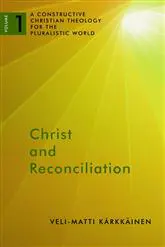

Christ and Reconciliation (A Constructive Christian Theology for the Pluralistic World: Volume 1)
Pages
467
Publisher
Eerdmans
Published
5/26/2013
ISBN-13
9780802868534
The first installment in a wide and deep constructive theology for our time
In Christ and Reconciliation Veli-Matti Kärkkäinen develops a constructive Christology and theology of salvation in dialogue with the best of Christian tradition, with contemporary theology in its global and contextual diversity, and with other major living faiths.
Kärkkäinen's Constructive Christian Theology for the Pluralistic World is a five-volume project that aims to develop a new approach to and method of doing Christian theology in our pluralistic world at the beginning of the third millennium. Topics such as diversity, inclusivity, violence, power, cultural hybridity, and justice are part of the constructive theological discussion along with classical topics such as the messianic consciousness, incarnation, atonement, and the person of Christ.
With the metaphor of hospitality serving as the framework for his discussion, Kärkkäinen engages Judaism, Islam, Buddhism, and Hinduism in sympathetic and critical mutual dialogue while remaining robustly Christian in his convictions. Never before has a full-scale doctrinal theology been attempted in such a wide and deep dialogical mode.
In Christ and Reconciliation Veli-Matti Kärkkäinen develops a constructive Christology and theology of salvation in dialogue with the best of Christian tradition, with contemporary theology in its global and contextual diversity, and with other major living faiths.
Kärkkäinen's Constructive Christian Theology for the Pluralistic World is a five-volume project that aims to develop a new approach to and method of doing Christian theology in our pluralistic world at the beginning of the third millennium. Topics such as diversity, inclusivity, violence, power, cultural hybridity, and justice are part of the constructive theological discussion along with classical topics such as the messianic consciousness, incarnation, atonement, and the person of Christ.
With the metaphor of hospitality serving as the framework for his discussion, Kärkkäinen engages Judaism, Islam, Buddhism, and Hinduism in sympathetic and critical mutual dialogue while remaining robustly Christian in his convictions. Never before has a full-scale doctrinal theology been attempted in such a wide and deep dialogical mode.